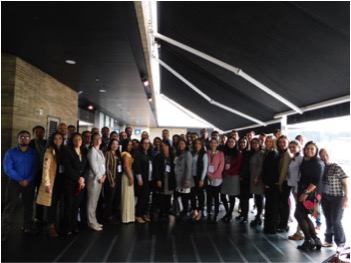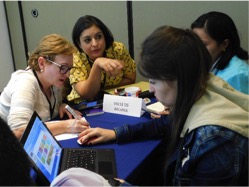Shifting to electric mobility, building the infrastructure and culture needed to boost cycling, improving connectivity between modes of transport, involving the private sector in supporting active mobility, comprehensive air quality monitoring systems, giving the health sector the tools to participate in policy processes that influence air quality, and including health costs and benefits in these processes.
These are just a sample of the measures taken by Colombian BreatheLife cities Barranquilla, Bogotá and Cali and regions the Aburra Valley and Caldas, which were discussed and showcased at a BreatheLife workshop organized by the Pan American Health Organization (PAHO), in collaboration with the Climate and Clean Air Coalition (CCAC) and the Clean Air Institute (CAI).
The workshop, held over two days in July, was one in a series of workshops that began in 2017, aimed at supporting BreatheLife member cities as they implement their air quality management plans, by promoting dialogue among actors and providing specialized technical assistance by Latin American experts.
This latest workshop brought together international experts and representatives from the Ministries of Health, Transport and Environment to unite on and address issues of common interest that contribute to reducing air pollution, giving cities the impetus needed to adopt more effective tools to improve air quality in urban environments while cutting greenhouse gases and short-lived climate pollutants and protecting health.
The sessions focused on sustainable mobility (with an emphasis on electro-mobility), quality control and quality assurance in air quality monitoring networks, development of integrated emissions inventories, and health (with emphases on health surveillance and burden of disease assessment, using the AirQ+ tool).
The workshop also took stock of progress among Colombia’s BreatheLife members.
Air quality monitoring emerged as one of their main strengths, with all the country’s BreatheLife cities and regions having established accredited air quality monitoring networks and ensuring relevant information was regularly accessible to the public.
The cities registered significant progress in terms of planning for sustainable mobility: Colombia’s BreatheLife cities have put in place mobility strategies that incorporate active mobility, with emphases on bicycles and pedestrian transport; collective public transport, freight transport management, and private transport planning. There is also progress in the implementation of alternatives for electric transport.
The stock-take also clocked a growing interest in incorporating the aspect of health into air quality management through the assessment of disease burden and epidemiological surveillance of events related to air pollution; members have already started developing local epidemiological studies and voicing the importance of strengthening the connection between health and environment sectors in the management of air quality.
An overview of the sessions’ achievements include the following:
• Strengthening a collaborative scheme between different areas of the cities and the national government, articulated with air quality boards;
• Sharing learned lessons and successful strategies among participating cities;
• Identifying strategic actions to advance in the implementation of the plans;
• Detecting strategic actions to strengthen the air quality and health roadmaps in the participating cities; and
• Developing supplies for the formulation of a roadmap to strengthen the technical assistance component in BreatheLife cities.
Fifty-nine participants, including representatives from Breathe Life member cities and regions attended the workshop, joined by delegates from the national government (Colombia itself is a BreatheLife country member) and speakers/representatives from other partner organizations such as Swiss Contact, Findeter, C40 Cities and the World Resources Institute.

Officials from the Ministries of Environment, Transport and Health in Colombia’s BreatheLife cities and regions attended the workshop together with a national delegation and international experts
Colombia, one of the leading countries in implementing the Breathe Life campaign in Latin America, was chosen as the first country to host the BreatheLife workshops.
“This latest workshop demonstrates through lived experience what is possible in terms of implementing solutions to the air pollution problem, but also how they can evolve and improve with the knowledge, processes and tools to ensure the inclusion of all costs and benefits, including those relating to health,” said Pan American Health Organization (PAHO) Air Quality Specialist, Karin Troncoso.
“It also shows what we can achieve through working across governments and learning from each other, and it sets a precedent for countries and cities in Latin America to advance capacity building activities that enhance their technical and management abilities to tackle air pollution, climate change and health together, maximizing payoff for their efforts and investments,” said Clean Air Institute specialist and Campaign Coordinator, Natalia Restrepo.
Banner photo by Cidades para Pessoas/CC BY 2.0
